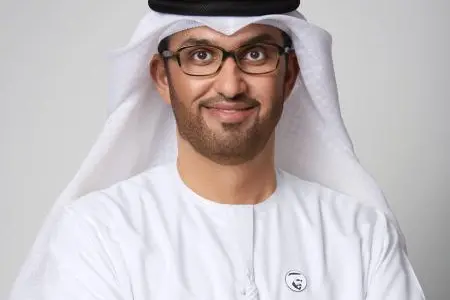PHOTO
- The virtual meeting will be held under the theme “Investing Today. Transforming Tomorrow.”
Abu Dhabi: Under the patronage of His Highness Sheikh Mohammed bin Rashid Al Maktoum, Vice President and Prime Minister of the United Arab Emirates and Ruler of Dubai, the UAE will chair the 6th Annual Asian Infrastructure Investment Bank (AIIB) Board of Governors Meeting next week. It will convene 103 members as well as strategic partners from around the world.
The Meeting, which is being held virtually under the theme “Investing Today. Transforming Tomorrow.”, will take place from 26 to 28 October. For the first time AIIB will hold its Annual Meeting in the Middle East.
The UAE is one of the founding members of the AIIB, and the 2021 Annual Meeting will be chaired by His Excellency Dr. Sultan Al Jaber, UAE Minister of Industry and Advanced Technology and the UAE’s Governor on the AIIB Board of Governors.
The Meeting will focus on a number of key themes, including investing in the infrastructure for tomorrow such as cross-border connectivity, green financing, resilient healthcare infrastructure and the role of global multilateral institutions in contributing to supporting projects based on ESG principles.
Commenting on the occasion, His Excellency Dr. Sultan Al Jaber said: “In chairing the 2021 AIIB Meeting, the UAE is reinforcing its commitment to promoting global initiatives that accelerate the development of a sustainable economy and drive a green infrastructure agenda.”
“There is clear alignment between the AIIB’s mandate and the UAE’s strategic plans, including the ‘Principles of the 50’ and the UAE Net Zero by 2050 strategic initiative. The UAE’s competitive advantages, expertise and experience complement the AIIB’s work to advance infrastructure investment in emerging markets and developing economies. In addition, our reputation as a trusted and responsible investor will help attract high quality investment partnerships,” he continued.
This year’s meeting comes at a historic moment, coinciding with the hosting of Expo 2020, and an increased global interest in taking serious climate action. We look forward to chairing the Annual Meeting, which I’m confident will result in insightful and productive discussions to accelerate the sustainable economy and drive infrastructure development” he concluded.
On the sidelines of the virtual meeting, the UAE will host two seminars in Abu Dhabi focused on the UAE and the Middle East. The first seminar focuses on “How innovative financing can bridge the infrastructure spending gap in the Middle East” and will take place on Wednesday, 27th October from 11:30 to 12:15 UAE time at Abu Dhabi Global Market (ADGM) in Mariyah Island. The second seminar will look at “How the UAE is supporting climate resilient infrastructure across the Middle East” and will take place on Thursday, 28th October from 9:15 to 10:00 UAE time at IRENA headquarters in Masdar City.
Both seminars are open to the public to attend virtually after registration on the AIIB website: www.aiib.org
The meeting takes place at a time when the world needs more than 50 trillion US dollars by 2030 to upgrade and build reliable infrastructure. Mobilizing private capital is key to delivering on this task and eliminating the global infrastructure investment gap will require tremendous international cooperation. Governments will need to champion assets that are attractive to private investment and the private sector must invest in projects informed by ESG (Environmental, Social, Governance) principles.
As part of the ‘Principles of the 50’, sustainability forms a core part of the country’s development plans, with local and global investments supporting both its environmental and economic efforts.
In 2020, the Asian Infrastructure Investment Bank announced its strategic ambition to allocate 50% of its total funding until 2025 to climate-friendly projects (for reference, climate finance accounted for 41 percent in 2020). As one of the founding members of the AIIB, the UAE is committed to supporting this vision, and to continue to drive sustainable development through innovation.
-Ends-
About AIIB
The Asian Infrastructure Investment Bank is a multilateral development bank that aims to improve living and economic conditions in Asian countries by supporting infrastructure projects. The Beijing-based bank began operations in January 2016 and currently has 103 members from around the world. By investing in sustainable infrastructure projects and productive sectors in Asia and beyond, the Bank seeks to strengthen communication between people and connect services and markets to build a better future for millions of people around the world.
© Press Release 2021
Disclaimer: The contents of this press release was provided from an external third party provider. This website is not responsible for, and does not control, such external content. This content is provided on an “as is” and “as available” basis and has not been edited in any way. Neither this website nor our affiliates guarantee the accuracy of or endorse the views or opinions expressed in this press release.
The press release is provided for informational purposes only. The content does not provide tax, legal or investment advice or opinion regarding the suitability, value or profitability of any particular security, portfolio or investment strategy. Neither this website nor our affiliates shall be liable for any errors or inaccuracies in the content, or for any actions taken by you in reliance thereon. You expressly agree that your use of the information within this article is at your sole risk.
To the fullest extent permitted by applicable law, this website, its parent company, its subsidiaries, its affiliates and the respective shareholders, directors, officers, employees, agents, advertisers, content providers and licensors will not be liable (jointly or severally) to you for any direct, indirect, consequential, special, incidental, punitive or exemplary damages, including without limitation, lost profits, lost savings and lost revenues, whether in negligence, tort, contract or any other theory of liability, even if the parties have been advised of the possibility or could have foreseen any such damages.




















